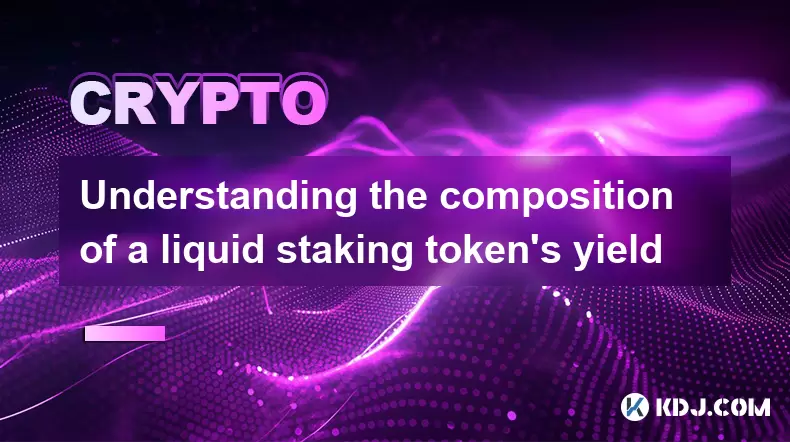-
 bitcoin
bitcoin $87959.907984 USD
1.34% -
 ethereum
ethereum $2920.497338 USD
3.04% -
 tether
tether $0.999775 USD
0.00% -
 xrp
xrp $2.237324 USD
8.12% -
 bnb
bnb $860.243768 USD
0.90% -
 solana
solana $138.089498 USD
5.43% -
 usd-coin
usd-coin $0.999807 USD
0.01% -
 tron
tron $0.272801 USD
-1.53% -
 dogecoin
dogecoin $0.150904 USD
2.96% -
 cardano
cardano $0.421635 USD
1.97% -
 hyperliquid
hyperliquid $32.152445 USD
2.23% -
 bitcoin-cash
bitcoin-cash $533.301069 USD
-1.94% -
 chainlink
chainlink $12.953417 USD
2.68% -
 unus-sed-leo
unus-sed-leo $9.535951 USD
0.73% -
 zcash
zcash $521.483386 USD
-2.87%
Are there insurance options for liquid staking?
Liquid staking lets users earn rewards while keeping funds liquid, but risks like smart contract failures, slashing, and market volatility remain, prompting interest in DeFi insurance options.
Jul 19, 2025 at 06:08 pm

Understanding Liquid Staking and Its Risks
Liquid staking is a process where users stake their cryptocurrency assets to participate in network validation while retaining liquidity through the issuance of a derivative token representing their staked assets. This innovation allows stakers to earn rewards without locking up their funds. However, like any financial activity in the decentralized space, it comes with its own set of risks. These include smart contract vulnerabilities, slashing risks, and market volatility that can affect the value of the derivative tokens. As a result, users often wonder whether there are insurance options available to protect against potential losses.
Smart Contract Risks and Insurance Coverage
One of the primary concerns in liquid staking is the risk of smart contract failures. Since most liquid staking protocols rely heavily on smart contracts to issue tokens and manage staking operations, any bug or exploit can lead to significant losses. Some decentralized finance (DeFi) insurance platforms have started offering coverage for such risks. Protocols like Nexus Mutual and InsurAce allow users to purchase coverage that compensates them in the event of a smart contract hack or failure. To obtain this coverage, users must:
- Visit the insurance provider’s platform.
- Select the protocol they are interacting with.
- Specify the amount of coverage they desire.
- Pay a premium in the platform’s native token or stablecoin.
It is crucial to note that coverage may not be universal across all liquid staking platforms and must be verified for each specific protocol.
Slashing Insurance in Liquid Staking
Another risk unique to staking is slashing, which occurs when a validator misbehaves or goes offline, resulting in a penalty that reduces the staker’s holdings. Some liquid staking providers, like Lido Finance, offer partial protection against slashing under certain conditions. However, this is not a universal feature across all platforms. In cases where slashing protection is not built-in, users may explore third-party insurance services that provide coverage for validator-related penalties. These services typically require users to:
- Submit proof of staking activity.
- Undergo a risk assessment.
- Pay a premium based on the perceived risk level.
Users should carefully review the terms and conditions of such insurance products to understand what types of slashing events are covered.
Market Risk and Derivative Token Volatility
Liquid staking platforms issue staked tokens (e.g., stETH, rETH) that represent the user’s share of the staking pool. These tokens can fluctuate in value due to market conditions and depegging events. While this is not a traditional insurance risk, some platforms are exploring hedging mechanisms and price protection tools. For example, Derivative platforms like Lyra Finance or Opium may offer options or futures contracts that allow users to hedge against price drops of their staked tokens. To engage in such hedging:
- Users must connect their wallet to the derivative platform.
- Select the appropriate derivative instrument.
- Set the strike price and expiration date.
- Pay a fee for the option or contract.
This approach is more advanced and requires a good understanding of options trading and tokenomics.
Insurance from Liquid Staking Providers Themselves
Some liquid staking platforms have started integrating insurance mechanisms directly into their protocols to enhance user confidence. For instance, Lido Finance has a security module that includes a coverage pool funded by a portion of the protocol’s revenue. This fund can be used to compensate users in case of slashing or other covered events. Similarly, Rocket Pool offers insurance against node operator failure by requiring node operators to deposit ETH as a guarantee. Users can benefit from these protections by:
- Choosing a reputable liquid staking provider.
- Reviewing the protocol’s documentation for insurance features.
- Participating in governance proposals that enhance security.
It is essential to verify whether the insurance fund is adequately capitalized and how claims are processed in case of incidents.
Frequently Asked Questions (FAQs)
Q1: Can I get insurance for all liquid staking platforms?No, not all liquid staking platforms are covered by insurance. Coverage depends on the platform and whether it has partnered with an insurance provider or has its own security fund. Always check the platform’s official documentation and security audits.
Q2: Does insurance cover losses from user errors like private key loss?Most DeFi insurance products do not cover losses caused by user mistakes such as losing private keys or sending funds to the wrong address. Insurance typically covers protocol-level risks like hacks or slashing.
Q3: How do I file a claim if my staked assets are compromised?Filing a claim usually involves submitting evidence of the loss through the insurance provider’s platform. This may include transaction hashes, wallet addresses, and a detailed description of the incident. Each provider has its own claim process and verification timeline.
Q4: Are insurance premiums for liquid staking expensive?Premium costs vary depending on the platform, the amount of coverage, and the risk profile of the protocol. Some platforms offer dynamic pricing models where premiums adjust based on current risk assessments.
Disclaimer:info@kdj.com
The information provided is not trading advice. kdj.com does not assume any responsibility for any investments made based on the information provided in this article. Cryptocurrencies are highly volatile and it is highly recommended that you invest with caution after thorough research!
If you believe that the content used on this website infringes your copyright, please contact us immediately (info@kdj.com) and we will delete it promptly.
- Trump's Northern Blast: How Canada Remarks Jolted WLFI Price and Shook Crypto Holders
- 2026-02-01 21:55:01
- LivLive Ignites Crypto Presale with Trillion-Dollar Ambitions: The Reality Layer Takes Center Stage
- 2026-02-01 21:50:02
- Buttcoin's Big Apple Buzz: Surging on Coinbase, Trending in the Crypto Wild West
- 2026-02-01 21:45:01
- Tokenization, Stablecoins, Remittances: The New York Minute for Global Finance
- 2026-02-01 19:20:01
- BlockDAG Poised for 100x Crypto Opportunity as Presale Enters Final Hours, Promising Massive Gains
- 2026-02-01 19:20:01
- Circle Charts Bold Course: Stablecoins to Reshape Global Finance by 2026
- 2026-02-01 19:25:01
Related knowledge

Understanding the composition of a liquid staking token's yield
Jul 20,2025 at 09:07am
What Is a Liquid Staking Token?A liquid staking token is a representative asset issued to users who stake their native cryptocurrency on a proof-of-st...

Is it better to stake directly or use a liquid staking service?
Jul 22,2025 at 08:21pm
Understanding the Basics of StakingStaking in the context of blockchain and cryptocurrency refers to the process of locking up digital assets to suppo...

What to do during an LST depeg event
Jul 20,2025 at 04:57pm
Understanding LST Depeg EventsAn LST (Liquid Staking Token) depeg event occurs when the token, which is typically pegged to the value of the underlyin...

How to find new liquid staking projects
Jul 30,2025 at 01:14pm
Understanding Liquid Staking and Its ImportanceLiquid staking is a mechanism that allows users to stake their cryptocurrency assets while still mainta...

Can you provide liquidity with liquid staking tokens?
Jul 22,2025 at 10:22am
Understanding Liquid Staking TokensLiquid staking tokens (LSTs) are derivative tokens that represent staked assets on a proof-of-stake (PoS) blockchai...

What are the best wallets for storing LSTs?
Jul 21,2025 at 03:14pm
Understanding LSTs and the Need for Secure StorageLSTs, or Liquid Staking Tokens, are derivative tokens representing staked assets on a blockchain. Wh...

Understanding the composition of a liquid staking token's yield
Jul 20,2025 at 09:07am
What Is a Liquid Staking Token?A liquid staking token is a representative asset issued to users who stake their native cryptocurrency on a proof-of-st...

Is it better to stake directly or use a liquid staking service?
Jul 22,2025 at 08:21pm
Understanding the Basics of StakingStaking in the context of blockchain and cryptocurrency refers to the process of locking up digital assets to suppo...

What to do during an LST depeg event
Jul 20,2025 at 04:57pm
Understanding LST Depeg EventsAn LST (Liquid Staking Token) depeg event occurs when the token, which is typically pegged to the value of the underlyin...

How to find new liquid staking projects
Jul 30,2025 at 01:14pm
Understanding Liquid Staking and Its ImportanceLiquid staking is a mechanism that allows users to stake their cryptocurrency assets while still mainta...

Can you provide liquidity with liquid staking tokens?
Jul 22,2025 at 10:22am
Understanding Liquid Staking TokensLiquid staking tokens (LSTs) are derivative tokens that represent staked assets on a proof-of-stake (PoS) blockchai...

What are the best wallets for storing LSTs?
Jul 21,2025 at 03:14pm
Understanding LSTs and the Need for Secure StorageLSTs, or Liquid Staking Tokens, are derivative tokens representing staked assets on a blockchain. Wh...
See all articles
























![[Audio stories] Streamer Became a Billionaire Overnight After Buying One Junk Coin [Audio stories] Streamer Became a Billionaire Overnight After Buying One Junk Coin](/uploads/2026/02/01/cryptocurrencies-news/videos/origin_697eaa9a495ed_image_500_375.webp)

















































